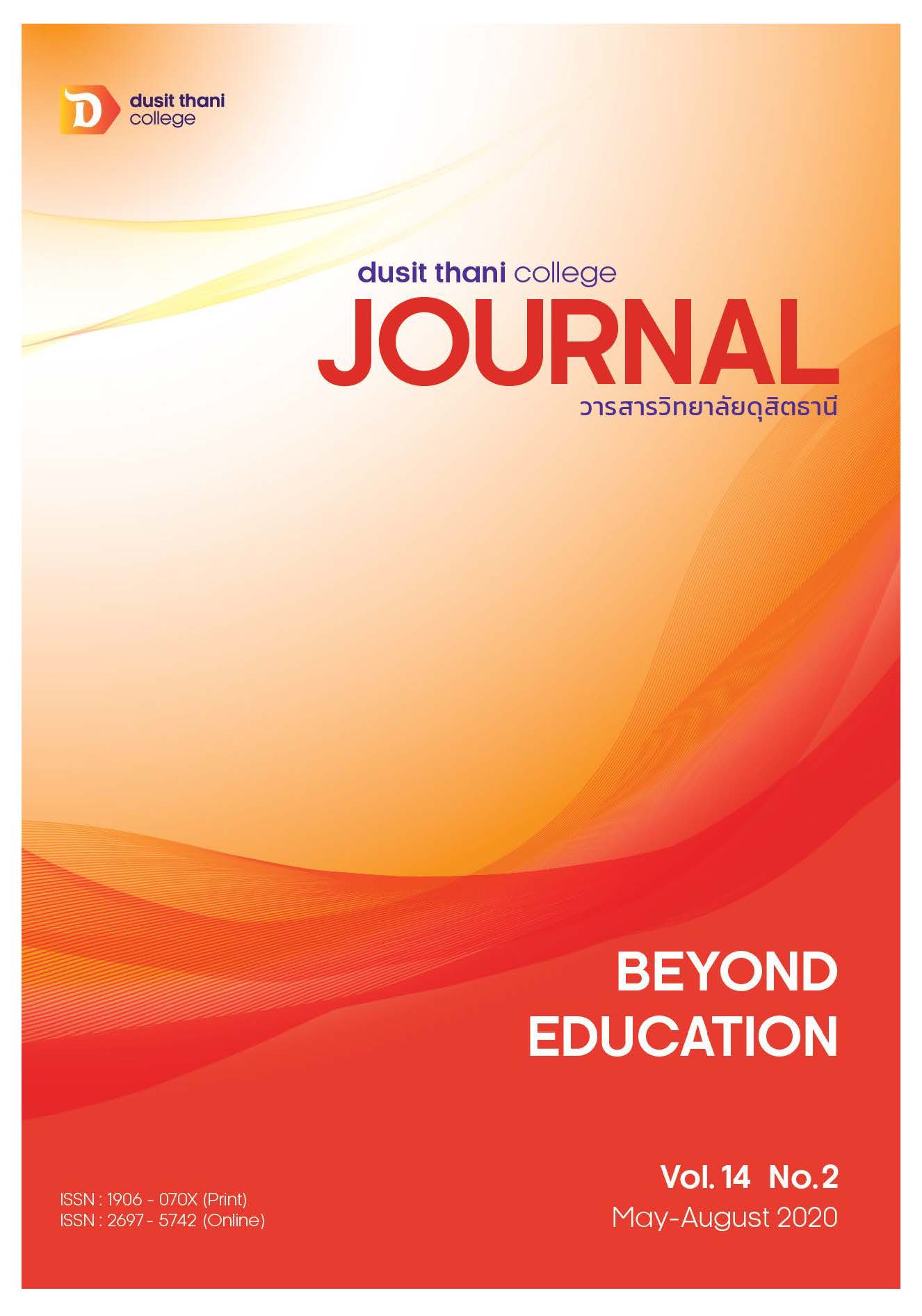Talent Management Strategy: Organizational Socialization
Main Article Content
Abstract
Every organization nowadays aim to build their competitive advantage in which human resource is the valuable resource who will drive the organization to accomplish. The organization is not only developing their human resource to be competent but also facing the challenge in managing their talents. The objective of this article is to present the concept of Organizational Socialization and Talent Management strategy. The key findings of talent management emerging from the literature review focus on the recruitment of talent which mainly from internal source by considering from talent’s performance, leadership, attitude and the potential. The effective methods in talent’s training and development are job rotation, self-study program, job enlargement, special assignment to develop talent’s competency, domestic and overseas field trip, and specific training course. In addition, the talent’s motivation to contribute high effort to the organization is to apply fair and flexible performance based payment/reward. Finally, the talent retention can be done by giving an opportunity to learn and develop, idea sharing and innovative creation, giving a special assignment, building good relationship between supervisor and talent, and arranging favorable working environment which focuses on flexibility and work-life balance.
Article Details
Article Screening Policy
- All research and academic articles to be published must be considered and screened by three peer reviews in the relevant field / article.
- All articles, texts, illustrations and tables published in the journal are the personal opinions of the authors. Editors don't always have to agree. And no responsibility whatsoever is the sole responsibility of the author.
- The articles to be published must never be published. Where did you first publish? And not in the consideration of other journals If the audit found that there has been a duplicate publication It is the sole responsibility of the author.
- Any article that the reader sees as being plagiarized or impersonated without reference. Or mislead the work of the author Please let the journal editor know it will be your greatest blessing.
References
Key success factors for sustainable competitive advantage. Veridian E-Journal, Silpakorn University, 8(3), 1096-1112. (in Thai)
Berger, L. A. (2004). Creating a talent management system for organization excellence: Connecting the dots. The Talent Management Handbook, 3-21.
Berger, L. A., & Berger, D. R. (Eds.). (2011). The talent management handbook:
Creating a sustainable competitive advantage by selecting, developing, and promoting the best people. New York: McGraw-Hill.
Broom, L. & Selznick, P. (1973). Sociology: A text with adapted Readings.
New York: Harper and Row.
Chao, G. T., O’Leary-Kelly, A.M., Wolf, S., Klein, H.J. and Gardner, P. D. (1994). Organizational Socialization: Its content and consequences. Journal of Applied Psychology,
79(5), 730-743.
Deaux, K., & Wrightsman, L. S. (1988). Social Psychology. Brooks.
Feldman, D. C. (1983). A Socialization Process that Helps New Recruits Succeed. In Perspective on Behavior in Organizations. R. J. Hackman, E. E. Lower III & L. W. Porter, (Eds). New York: McGraw-Hill.
Grobler, P.A. & Diedericks, H. (2009). Talent management: An empirical study of selected South African hotel groups. Southern African Business Review, 13(3), 1-27.
Junprasert, T., & Thammaruksasit,N. (2015). Professional socialization: A developmental process of professionalism in the work life. Journal of Behavioral Science,
21(1), 193-206. (in Thai).
Kendall, D. (2012). Sociology in our times. Cengage Learning.
Marketeeronline. (2018). Central Group's talent development inside story. (Online).
Retrieved 12 February 2020 from https://marketeeronline.co/archives/25341 (in Thai)
Mercer, B. E. & Merton, R. K. (1958). The study of Society. New York: Harcout and World.
Michaels, E., Handfield-Jones, H., & Axelrod, B. (2001). The war for talent. Harvard Business Press.
Nantawattananukul, A., Sadangharn, P. & Ingard, A. (2016). The talent management model in electrical and electronics industry companies. Burapha Journal of Business Management, Faculty of Management and Tourism Burapha University, 4(1), 55-71. (in Thai)
Permkwakao, K. (2016). Employee satisfaction with talent management practices at a commercial bank in Thailand. Master of Business Administation,
Faculty of Commerce and Accountancy, Thammasat University. (in Thai)
Prachasilchai, M. (2012). Quality of work life, psychological characteristics, organizational socialization, and employee passion: A case study of employees in a private company. Master of Science, School of Human Resource Development,
National Institute of Development Administration (NIDA). (in Thai)
Prasongthan, S. (2015). Talent management: Tool to enhance organizational capability. Srinakharinwirot Business Journal, 6(2), 145-150. (in Thai)
Rapeepisan, V. (2011). Principles of Human Resources Management. Bangkok: Vijithattakorn. (in Thai)
Robertson, A., & Abbey, G. (2003). Managing Talented People: Getting on with-and Getting the Best from-Your Top Talent. Pearson Education.
Rungrerngsuk, S. (2016). Starbucks' human resources management style. (Online). Retrieved 14 February 2020 from https://www.bangkokbiznews.com/blog/detail/637458 (in Thai)
Schein, E.H. (1977). Toward a theory of organizational socialization.
Annual review of research in organizational behavior, 1, New York: JIP Press.
Siam Cement Group. (2020). Employee development. (Online). Retrieved 10 February 2020 from https://www.scg.com/th/06career_scg/03_internship_trainee_blog.html (in Thai)
Sirawatthanasak, A. (2015). How organizational socialization tactics affects organizational citizenship behavior of operational level employees at a five-star hotel in Bangkok, Thailand. Master of Business Administration, Faculty of Commerce and Accountancy, Thammasat University. (in Thai)
Sorod, B. (2015). Sustainable human resource development through organizational socialization process. In the 49th anniversary of the National Institute of Development Administration on “Development administration, globalization and sustainable development”, 1 April 2015, (pp. 581-602). (in Thai)
Tanyaphuech, A. (2014). Talent Management. (Online). Retrieved 12 December 2017 from http://www.op.mahidol.ac.th/orpr/newhrsite/ebook/MUHR/
Document/MUHR/8.pdf (in Thai)


